
Sunday, October 29, 2006
Keith Wasserstrom's Second Defense: I Acted In Accordance With Jewish Law
In the time I've been with him, I've seen him only act with accordance to
ethics and that's why I firmly believe in this case, when all the facts come
out, I'm very confident that he'll be shown to have acted within the ethical
framework of Jewish law.
I guess Menashe Frank is saying that, according to Jewish law, it is permissible for an elected official to falsify ethics disclosure forms, and to make a few extra shekels down the road by lobbying his fellow elected officials to give a lucrative contract to a company who just happens to be his law firm's client. This might be a winning argument, if Keith was going to be judged by the Sanhedrin.
So Keith's first defense was the City Attorney said it was ok. The article does not report Keith is retreating from that defense, but it does suggest Keith's second defense: I'm a good little Jewish boy and the Torah says what I did is ok.
My parents were both Jewish, I went to Hebrew school, and I was Bar Mitzvah. My opinion: It is an insult to the Jewish religion for Keith and his friends to try to absolve Keith's apparently unlawful alleged conduct by (figuratively) wrapping him in a tallis and implying that purported conformance with some religious code trumps or excuses compliance with Florida law.
Update: On November 15, 2006, I was contacted by Menasche Frank, the friend of Keith Wasserstrom who was quoted in the October 29, 2006 Miami Herald article. Mr. Frank made the following points of clarification:
- He believes Keith did not engage in the conduct of which he is accused, and he believes Keith did not violate either Jewish law or Florida law.
- He did not intend to imply that Jewish law and ethics would permit the falsification of disclosure forms or any of the other conduct of which Keith is accused.
- He contacted the Miami Herald on his own initiative to provide a good character reference on Keith's behalf. Therefore, my post was incorrect if it intended to imply that he did so as part of some coordinated public defense of Keith by Keith and his friends.
Saturday, October 28, 2006
What's This About: Conservatives Without Conscience by John W. Dean
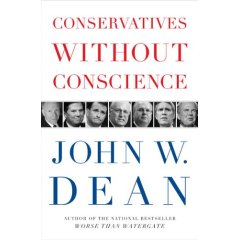
John W. Dean, White House legal counsel to President Nixon, during the Watergate era, and author of numerous best sellers since then, wrote a book published in July 2006, entitled Conservatives Without Conscience.
What does this book say?
Dean believes the conservative movement that has come to dominate American politics in the past 20 years is much different from traditional conservatism, as well as the conservative movement of the 1960's and 70's embodied by Barry Goldwater.
Traditional conservatism, according to Dean, was cautious, defended the staus quo, believed change should occur incrementally and gradually, and was averse to dramatic social upheavals. Dean believes the modern conservative movement departs from traditional conservatism by embracing radical means and adopting drastic measures to achieve the goal of restoring what they perceive as America's cultural traditions.
According to Dean, Goldwater's conservatism emphasized libertarianism, fiscal responsibility, civil rights, and equality. In contrast, Dean claims modern conservatives are moralists and spendthrifts who want to see government regulate private conduct and curb civil liberties.
Much of Dean's book appears to be devoted to elaborating on what he believes to be the psychological profile of modern conservatives, both the followers and the leaders. According to Dean, forty years of psychological data and sociological studies suggest that people who identify themselves as conservatives do so because they have "a heightened psychological need to manage uncertainty and threat." Among the psychological characterisitics associated with political conservatives are: high levels of fear, an aversion to ambiguity, overreaction to threats, an inordinate need for structure and a strong desire to dominate others. Dean claims this constellation of traits is not normally correlated with liberals.
Dean draws on the work of linguist George Lakoff, whom Dean cites for the proposition that different models of the "ideal family" drive conservatives and liberals. According to Dean, Lakoff believes that liberals are unconsciously shaped by what he calls the Nurturant Parenting model, which emphasizes traits such as equality, empathy, and understanding, while conservatives are shaped by the Strict Father parenting style, which emphasizes obedience, discipline, and following rules, and engenders a reverence for authority figures as being necessary to stand up to and defeat evil in a highly dangerous world.
Research shows, claims Dean, that "authoritarianism is consistently associated with right-wing but not left-wing ideology." Dean cites scientist Bob Altemeyer as having developed the Right Wing Authoritarianism (RWA) scale, under which the following criteria are used to identify the authoritarian personality type:
The Followers:
- Submissive to authority - accept without criticism the statements and actions of authority figures (parents, political leaders, police, and religious figures). Are intolerant when such figures are criticized.
- Aggressive support of authority - easily accept aggression sanctioned by authority figures.
- Conventionality - accept follow, and defend the traditional norms of society. Often tend toward fundamentalism in religious matters.
The RWA scale is useful for identifying followers, but is far less useful for identifying authoritarian leaders. For this, says Dean, scientists have developed the Social Dominance Orientation (SDO) theory.
The Leaders:
- Control and command - seize every opportunity to lead and enjoy having power over others.
- Inequality is inevitable - social dominators believe some people are just more worthy than others.
- Rough world - social dominance orientation emphasizes traits like toughness, hardness, and ruthlessness as opposed to compassion, altruism, and caring.
According to Dean, social dominators exhibit little moral restraint; for them, there is no right and wrong, only what you can get away with. As a result, they tend to be highly manipulative. Authoritarian followers are especially likely to trust someone who tells them what they want to hear. Social dominators are very adept at spinning stories they believe will get them what they want from followers. Thus, the two groups form a mutually reinforcing dyad.
Dean acknowledges that not all conservatives are authoritarians. Nevertheless, Dean contends that most authoritarians are conservative.
Dean believes that only recently has authoritarian conservatism gained widespread acceptance in American political life, threatening libertarian and traditional thinking. According to Dean, Bush and Cheney have used 9/11 as an excuse to enact their authoritarian tendencies. Bush has claimed extraordinary powers and the right to conduct executive activities in total secrecy and without accountability - all hallmarks of authoritarian thinking - but the results have not been greater success in the war on terror. Rather, authoritarianism and secrecy have bred incompetence. Perversely, the dangers that flow from incompetence are often cited as proof that the authoritarian leader requires even greater powers.
Dean asserts that Bush and Cheney, in contrast to other American leaders, have made fear mongering standard operating procedure. But fear mongering takes reason out of the decision making process, which history shows is a dangerous route to take.
Dean believes authoritarianism carries many risks. First, it is a precursor to fascism. Second, it isolates the ruling class in unhealthy ways. Finally, authoritarian personalities in government will seek to eliminate checks and balances intended to function as error-correcting mechanisms. Left unchecked, the authoritarian conservative movement may dismantle our democratic system of government.
Monday, October 23, 2006
Iraq: It's the Oil, Stupid!
In his usual inarticulate manner, President Bush appears to have said, in essence, that it is important to establish a democracy in Iraq because that would be a defeat for "the terrorists" and that control of Iraq by "the terrorists" is a threat because "I can conceivably see a world in which radicals and extremists control oil. And they would say to the West: You either abandon Israel, for example, or we're going to run the price of oil up. Or withdraw…"
These words from President Bush appear to strongly support the contention that the entire Iraq debacle was and continues to be about ensuring United States access to, control over, and/or development of, Iraq's vast oil reserves, the second-largest amount of proven oil reserves in the world.
To minimize claims of my taking the President's words out of context, below is the context. The entire interview transcript is here.
STEPHANOPOULOS: But whatever you call it, aren't American men and women now dying to prevent Sunnis and Shiites from killing each other?
BUSH: No. George, I — it's dangerous. And you're right, no matter what you call it.
The fundamental question is: Are we on our way to achieving a goal, which is an Iraq that can defend itself, sustain itself and govern itself and be an ally in the war on terror in the heart of the Middle East.
STEPHANOPOULOS: It seems like, every month, we're going farther from that.
BUSH: Well, I don't know why you would say that. I mean…
STEPHANOPOULOS: The casualties are going up.
BUSH: … if that's the definition of success or failure, the number of casualties, then you're right. But that's what the enemy knows. See, they try to define success or failure.
I define success or failure as to whether or not the Iraqis will be able to defend themselves. I define success or failure as whether the unity government's making difficult — the difficult decisions necessary to unite the country.
I define success or failure as whether schools are being built, or hospitals are being opened. I define success or failure as whether we're seeing a democracy grow in the heart of the Middle East.
Because a democracy in the Middle East, a society based upon liberty, will be a defeat for the terrorists, who have clearly said they want a safe haven from which to launch attacks against America, a safe haven from which to topple moderate governments in the Middle East, a safe haven from which to spread their jihadist point of view, which is that there are no freedoms in the world; we will dictate to you how you think.
I know some Americans don't think that is a threat. I view it as a threat because — and the reason it's a threat is I can conceivably see a world in which radicals and extremists control oil. And they would say to the West: You either abandon Israel, for example, or we're going to run the price of oil up. Or withdraw…
I might have guessed that this utterance by President Bush was inadvertent, but I would have been wrong. President Bush was merely echoing a theme he included in a speech he gave on October 20, 2006 at a National Senatorial Committee Reception in Washington, D.C., in which he stated:
Imagine a world in which radical extremists not only topple moderate governments so they can have territory from which to plan, plot, and attack America and our allies, but they have the capacity to control oil resources, which they would be more than willing to use in order to blackmail America and our allies into further retreat. You can imagine a circumstance in which these radicals say, we'll run up the price of oil by denying oil on the markets unless you abandon your allies such as Israel, or unless you further withdraw from the world. And compound that with a nuclear Iran, and the world 20 or 30 years from now is going to say, what happened to them in 2006? How come they couldn't see the threat? What blinded these people in order that they did not do their job?
It appears the Bush Administration is fighting back against being ridiculed for its apparently disastrous policy in Iraq by finally disclosing the actual rationale for the entire Iraq invasion, regime-change, and nation-building enterprise: control of oil resources! Ironically, if you analyze the President's remarks, Iraq was not a moderate government, and it was not toppled by the radical extremists Bush is referring to. Iraq's government was toppled by the United States. [But the U.S. is not radical extremists, is it?] Bush appears to be referring to the perceived threat of radical extremists toppling the moderate government in the Middle East with the largest amount of proven oil reserves in the world, i.e., Saudi Arabia. Saudi Arabia does not have much, if any, military of its own. Good thing the U.S. has thousands of troops nearby in case any radical extremists were to threaten Saudi oil reserves!
Sunday, October 22, 2006
What's This About: Buck Wild by Stephen A. Slivinski
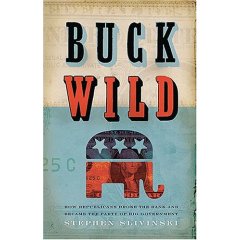
Stephen A. Slivinski, director of budget studies at the Cato Institute, wrote a book published in August 2006, entitled Buck Wild: How Republicans Blew the Bank and Became the Party of Big Government.
What does this book say?
The book presents a critique of the Republican Party, more specifically, Republicans in Congress and in the White House since Reagan Administration. It is a critique levelled at Washington Republicans from the right, from the perspective of a fiscal conservative who feels the true principles of the Republican Party have been betrayed.
Slivinski believes the Republican Party has abandoned limited government principles and thereby has betrayed the very foundations of the Party and threatens the future of the United States. Slivinski tries to show that Republicans, not Democrats, have become the biggest spenders in Washington.
Slivinski relates how, in May 2004, members of the Republican Study Committee, formed in 1973 by fiscal conservatives in the House of Representatives who viewed President Nixon as fiscally irresponsible, had to meet in the basement of the Capitol building lik a band of insurgents because they are alone against President George W. Bush and most of the Republican Congress who have embraced Big Government and expanded the welfare state beyond the dreams of even the most starry-eyed liberal Democrat.
According to Slivinski, Republicans in Congress were supposed to combat the big spending Democrats and give the power back to the people. Instead, they have far surpassed the Democrats in government growth, spending, and entitlement programs. The Republican Revolution of 1994 was about sending Republicans into the cesspool that was Congress to clean it up. Instead, Republicans got into the cesspool, found it felt more like a hot tub and decided to keep it the way it was.
Slivinski asserts that President George W. Bush has presided over a budget that has grown by 27% after adjusting for inflation. That's more than twice as fast as during the eight years of Clinton's presidency. In historical context, Bush is second only to Lyndon Johnson in federal spending. This remains true even if you deduct spending on defense, homeland security, and entitlements.
Government spending under George W. Bush, with Republicans in control of the White House and Congress, is 20% of U.S. gross domestic product. Slivinski cites data from the Joint Economic Committe of the U.S. Congress that performance of the U.S. economy is maximized when government spending is less than or equal to 15% of GDP. Under Clinton, when the White House and Congress were controlled by different parties, government spending was headed toward 17% of GDP.
Slivinski appears to claim that a divided government, in which Congress and the White House are controlled by different political parties, is better for U.S. economic performance. From the last eight presidencies, Slivinski says the facts show that government grows the slowest when it is divided because divided government means less government spending and, consequently, more economic growth. According to Slavinski, the statistics from 1965 to 2006 show that the slowest growth in government spending comes when there is a Democrat in the White House and Republican-controlled Congress. Second to that is a Republican President and a Republican Senate coupled with a Democratic House.
Saturday, October 21, 2006
Twilight in the Desert - Piercing the Veil of Saudi Oil Secrecy
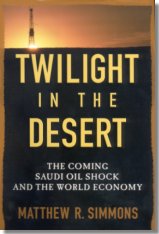
Matthew Simmons is a well-connected oil industry insider who has concluded that some of the world's largest oil beds may be on the verge of production collapse.
Author of Twilight in the Desert: The Coming Saudi Oil Shock and the World Economy, published in May 2005, Simmons is founder of Simmons & Company International, an investment bank that handles mergers and acquisitions among energy companies, and counts among its clients Halliburton, General Electric, and the World Bank. A graduate of the Harvard Business School, he served as an energy-policy adviser to the 2000 Bush-Cheney campaign.
A new review of Simmons' book recently ran on the Motley Fool website, and I thought it was worth sharing here.
Book Review: "Twilight in the Desert"
http://www.fool.com/news/commentary/2006/commentary06101819.htm
By Jean Graham
10/18/2006
In Twilight in the Desert, Matthew Simmons has written a pivotal and accessible work confronting the complacent notion that there is an inexhaustible supply of oil to be readily tapped when needed. Simmons has searched through hundreds of obscure SPE documents (Society of Petroleum Engineers) and found the paper trail that suggests the Saudi Oil Miracle may be entering its senescence, taking with it the capacity to produce more oil on demand.
The importance of Saudi oil cannot be disputed. The Saudis claim petroleum reserves of 262.7 billion barrels. In the Middle East, Iran reserves run a distant second at 130.7 billion barrels, and Bahrain has 0.7 billion barrels. There are 726.6 billion barrels under the sands of the Middle East, representing 63.3% of the world reserves. The Saudis have 22.9% of world reserves.
Matthew Simmons questions the accuracy of Saudi estimates of 262 billion barrels, and the capability of the aging giant fields to increase oil output on demand.
The golden age of exploration in Saudi Arabia lasted from 1941-1965 and saw the discovery of the major fields -- Ghawar, Abquaiq, Safaniya, and Berri. The Saudi oil miracle has been anchored by the largest and inarguably greatest oil field ever found -- Ghawar. Ghawar output has been strongly supported by the other super-giant fields -- Abqaiq, Safaniya, and Berri. In 1979, when Saudi Arabia's oil output was near its peak, these fields produced 8.5 million barrels per day (bpd) of the 9.8 million barrels a day of Saudi output. U.S. oil production peaked in 1970 at 10 million barrels per day and is now around 5 million bpd. The giant U.S. fields are in decline, as are many of the greatest oil fields around the world. Declining production is an inevitable, calculable series of events. Are the Saudi fields the exception? Simmons says no.
Ghawar has produced 55 billion barrels of oil and accounts for 55%-65% of all Saudi output. Because the world has relied on the Saudis' ability to open wellhead valves and provide the spare capacity in oil production needed in times of crisis and shortage, Simmons believes there may have been irreparable damage done by overproducing the giant oilfields, including Ghawar. This will ultimately lower the volume of recoverable oil. Since field-by-field data has not been available for more than two decades, it is difficult to know how the fields are faring.
Simmons clearly discusses the critical components of oil recoverability -- oil reservoir pressure, porosity, and permeability of the rock formations, fractures, and faults in the field. Reservoir pressure is produced by the presence of aquifers below the oil. This keeps gas bubbles trapped in the oil, much like the fizz in a can of soda. When fields are young, the pressure is naturally high, and the oil flows to the surface without artificial lifting or pushing. As the Saudi (and all) oil fields age, pressure can be created by injecting water at the edges of the field, which is what the Saudis have been aggressively doing for decades. More injected water produces higher percentages of water mixed with the oil (water cut).
As more complicated technology is used to suck oil out of declining fields, oil becomes expensive and the fields less productive. Even the greatest fields decline and fail. Prudhoe Bay, the last great U.S. giant, peaked at 1.5 million bpd in 1989 and has since declined to 300,000 bpd. The peak output lasted only 10 years. It happens to the best of them.
Ghawar was blessed with:
Fabulous permeability
Low-viscosity oil
High porosity
Very thick columns of oil
In its first decade of production, reservoir pressure was high enough to produce vast quantities of water-free oil. To maintain critical pressure, the Saudis began an early and intensive program of water injection at the flanks of the field. As water cuts reach unacceptable percentages, those wells must be shut down.
Ghawar has had water cut problems since the 1970s. The presence of water also makes measurement of oil production difficult, which throws into question any predictions of recoverable reserves. These are classic signs of problems in an aging field. Twilight for Ghawar may be approaching.
Abqaiq, Safaniya, and Berri are subject to similar aging problems:
Falling reservoir pressure
Rampant corrosion from years of water injection
Erratic water flow behavior in the rock
Growing water cuts in the oil
Lower productivity in the parts of each field remaining to be drilled
Although the Saudis have drawn a veil of secrecy over both individual field production and their technical problems, glimpses of the challenges involved in producing oil from aging fields are found in Aramco brochures meant to extol Saudi technology, but which are in fact admissions of difficult oil recovery. Technological advances include newer, vastly more expensive drilling techniques involving horizontal wells instead of vertical wells and the most sophisticated computer models of 3-D reservoir structures available, requiring millions of data points. Clearly, increasingly expensive and complex technology is necessary to produce the remaining oil, while massive water injection creates lower production in the form of higher water cuts.
If there were easy spare capacity available to increase production from the current nine million barrels a day to 12 or 15 million barrels a day the Saudis claim is possible, they wouldn't require these recovery methods. It's an admission of difficult production in aging fields, according to the author.
In spite of high oil prices, levels of non-OPEC oil production have been largely disappointing. The most surprising and unanticipated gains were from the former Soviet Union (FSU), emerging from reworked oil fields. There is little spare capacity available from non-FSU and non-OPEC fields, and there is uncertainty around the sustainability of Russian production. Because the Saudis have kept much of the intelligence regarding their oil output and field-by-field reserves secret, the world can only speculate about their ability to supply the ever-increasing global oil demands. Most of the world chooses to believe Saudi reassurances that the reserves are there.
Mr. Jum'ah of Aramco, the Saudi Arabian production and distribution company, was recently quoted in The Wall Street Journal as confirming more than a century's worth of recoverable oil reserves (5.7 trillion barrels) worldwide. Only 1.2 trillion barrels are deemed recoverable with current technology. The other estimated reserves will require technology that is yet to be developed or has been too expensive at current prices (as in tar sands) Of the proven recoverable reserves, the Saudis claim to have 262 billion barrels, which Simmons disputes, citing inaccurate measurement from water cuts and recovery methods that are forced to bypass much of the estimated recoverable oil in the ground.
Simmons believes that the other pillars of predicted reserves -- undiscovered super-giant fields -- are not there. The Saudis have failed to discover any notable fields since Shaybah in 1968, despite intensive exploration. It is their last multibillion-barrel field (reserves 14 billion barrels), able to produce 500,000 barrels per day. The recent Jack field discovery in the Gulf of Mexico may contain 3-15 billion barrels, which pales in comparison to the giants in the Kingdom. When these aging fields begin to fail, the world will experience oil shortages much sooner than the predicted 100 years.
Friday, October 13, 2006
Hey Abbott!!!! Keith Wasserstrom's Defense: City Attorney Said It Was OK

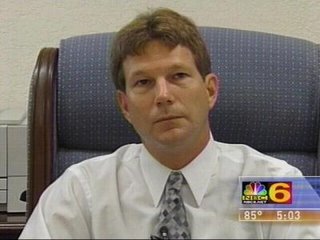
An October 12, 2006 press release from Keith Wasserstrom's criminal defense attorney announces the basis for Keith's (Keith is pictured above right) defense:
Before the vote on whether Hollywood should enter into the contract, Keith obtained clear advice from Hollywood City Attorney, Dan Abbott (pictured left), regarding the potential for ethical conflict and the state of the law as to his involvement with Normandy Group. Attorney Abbott specifically advised Keith that, if he recused himself from voting on the contract, and if he disclosed to the board his relationship with Normandy, he would not breach his ethical duty or violate the law. Keith followed Attorney Abbott’s advice, recused himself from the vote regarding the contract with Schwing-Bioset, and with Attorney Abbott’s assistance, Keith prepared and filed conflict disclosure forms.
It appears Keith is pinning his political and professional future on the advice of Hollywood City Attorney Dan Abbott, who, at least in the opinion of some people, is dumber than a bag of rocks. See also here. What if Abbott's advice was incorrect? Does that get Keith off the hook? Hey Keith, if Dan Abbott had advised you it was legal to rob a bank, would that be your defense to bank robbery?
Wednesday, October 11, 2006
Politicians Behaving Badly: Hollywood City Commissioner Keith Wasserstrom

Hollywood City Commissioner Keith Wasserstrom, who is also an attorney in South Florida, has been charged with five felonies: one count of unlawful compensation for official behavior and four counts of official misconduct arising out his relationship, while he was a city commissioner, as a lobbyist for a St. Paul, Minnesota-based company, called Schwing Bioset (“Schwing”), which he helped obtain an $18 million wastewater treatment contract from the City of Hollywood.
According to the Probable Cause Affidavit, Wasserstrom and his law firm at the time were retained to assist Schwing obtain a contract from the City of Hollywood. In exchange, Wasserstrom and his firm would be paid money when Schwing got contracts from other cities or counties, which would be a lot easier once Schwing had a contract with the City of Hollywood because other cities and counties would be permitted by Florida law to “piggy-back” off the Hollywood contract, avoiding the time and expense of a competitive bidding process. According to the Probable Cause Affidavit, while engaged in intensive lobbying of the City of Hollywood and his fellow commissioners on behalf of Schwing, Wasserstrom filed conflict forms in which he falsely stated that he and his law firm did not represent Schwing or its representatives in connection with efforts to win the Hollywood contract for Schwing.
To my knowledge, it is relatively common in Florida for local and state lawmakers to act as lobbyists for companies seeking business from governmental entities other than the ones they were elected to. I do not know enough about the facts or the applicable law to express an informed opinion as to whether Wasserstrom actually violated any laws.
But I have to ask: Hey Keith, was it worth the few extra shekels to lobby for a company to get a contract from the very city you were elected to represent as a commissioner? Did you really think you were being hired to help Schwing because you are such a great lawyer? Was it enough money to make it worth it for you to tarnish your image and potentially ruin your professional and political career, and jeopardize the well-being, reputation, and future of your wife and children? When did greed and avarice come to prevail in your mind over altruism and your desire to do good as a public servant?
What's This About: American Theocracy by Kevin Phillips
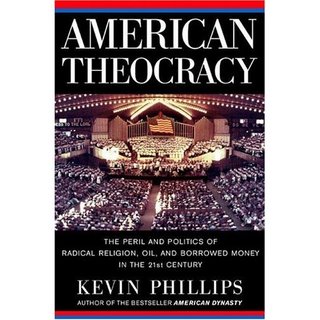
Kevin Phillips, former Republican strategist and current political commentator, wrote a book published in March 2006 entitled American Theocracy: The Peril and Politics of Radical Religion, Oil, and Borrowed Money in the 21st Century.
What does this book say?
All great world-dominating powers - from ancient Rome to the British Empire - have been brought down by a lethal combination of global overreach, militant religion, diminishing resources, and crippling debt.
America's security, solvency, and standing in the world are being undermined by:
1. military miscalculations in the Middle East;
2. the surge of fundamentalist religion; and,
3. the staggering national debt and the costs of U.S. oil dependence.
President George W. Bush's political base has three main pillars: oil interests, religious fundamentalists, and the financial services sector. Bush's policy decisions - both domestic and foreign - particularly the invasion of Iraq - are best understood as responses designed to serve the interests of his political base. Unfortunately, the interests of Bush's base are inimical to the interests of the United States as a whole. If America cannot reverse course from the agenda set by the Bush Administration, the future of the United States is likely to be very bleak.
Why Did the United States Invade Iraq?
The United States' emergence as a global empire was predicated on an oil-based industrial complex fueled by access to cheap and abundant petroleum. The era of inexpensive and abundant oil may be coming to an end. The precise state of Saudi oil reserves is a closely guarded secret, but many experts have warned American policy makers that the Saudis may be close to, or already have passed, the point of peak oil production. This means that in the near future, the law of diminishing returns will govern oil production - it will begin to cost more to produce oil even as there is less oil to produce. This could set the stage for resource wars as competing powers - China, the U.S., and Europe - scamper to maintain their oil lifelines.
The invasion of Iraq had a great deal to do with ensuring that America maintained control over a resource that is essential to its well-being. After 9/11, the Bush Administration had the perfect pretext for deposing Saddam Hussein and trying to establish American hegemony over Iraq's oil reserves (the second largest proven reserves in the world).
The opportunity to develop Iraq's relatively untapped oil fields was a tantalizing prospect for America's oil giants, whose long-term prospects have been in doubt because of a marked decrease in the share of the world's oil reserves they control. The Bush Administration could not sell the campaign to oust Saddam Hussein to the American people as a war for oil. Bush's political base, which includes a high percentage of devout Christians, would find the idea of a war for natural resources offensive to their deeply held beliefs. However, the Bush Administration's efforts to demonize Saddam Hussein and cast the notion of regime change as a crusade to spread liberty throughout the Islamic world was certain to strike a chord among many evangelical Christians.
What is the Role of Religious Fundamentalists?
According to Phillips, many in the Christian right, of which George W. Bush is the de facto leader, have an apocalyptic mindset, which is shaping the way a significant portion of the electorate approaches current events, particularly foreign policy issues regarding America's involvement in the Middle East. According to the apocalyptic scenarios subscribed to by religious fundamentalists, the faithful can expect wars on a worldwide scale, economic crashes, earthquakes, diseases, and virtually every other calamity imaginable. Thus, for a large segment of the population, the troubled occupation of Iraq and the administration's larger policy failures in the Middle East are not signs of executive incompetence, but rather, evidence of apocalyptic prophecies coming true.
It is not clear to what extent Phillips is asserting that the Bush Administration policy is shaped by such fundamentalist beliefs, or whether the Bush Administration cynically tailors some justifications for its policies to fit in with such beliefs, thus garnering popular support from fundamentalist voters. Phillips is clear, however, in asserting that such end-of-times views, in which religious fever was translated into military fervor, have, historically, proven dangerous and delusional.
The Financialization of the Economy
According to Phillips, the so-called FIRE sector - finance, insurance, and real estate - now accounts for 20 percent of America's GDP, well ahead of the 14.5 percent represented by manufacturing. The displacement of manufacturing by finance has prompted some to describe the U.S. as the "borrower-industrial complex."
It is estimated that he national debt the U.S. owes to foreign lenders exceeds $7.8 trillion. Household and corporate debt are also at record levels.
Historically, the ascension of finance is invariably associated with large gaps between rich and poor. In other words, when the most important economic activity is the creation and trading of abstract financial instruments, rather than the production of real goods and services, the rift between the haves and have-nots widens and society begins to fall apart.
Historically, a financial-services economy is not a recipe for long-term national success. This is because money is not necessarily wealth unless it is "expended on things that yield profits and attract riches from without to augment riches from within." It is questionable whether the U.S. can continue to attract the foreign investment it needs if it lacks "hard industries," companies that actually make products the rest of the world wants to buy. Many experts argue that if the U.S. loses its manufacturing lead, it will also lose its lead in research and development and once it loses that, it loses everything.
Rather than develop a comprehensive national economic strategy for the 21st century, the Bush Administration has placed its faith in "the invisible hand of the marketplace." For many critics, such as Warren Buffet and Clyde Prestowitz, relying on the "magic of the market" when factories are closing, neighborhoods are crumbling, and jobs are being outsourced is a myopic abdication of responsibility. This amounts in the end, as in so many other contexts for the Bush Administration, to a substitution of faith for reason.
Conclusion
Phillips warns that America's indebtedness and oil-dependence are symptomatic of imperial senescence. The United States can avoid the fate of past fallen empires only if it stops allowing ineffective bunglers and weak-willed leaders to try to preserve the status-quo by relying on a feeble faith that the future will always resemble the past even if one fails to prepare for it. Instead, the U.S. must forthrightly address the challenges ahead by, among other things, curbing public fuel consumption and controlling spending.
Sunday, October 08, 2006
Broward County School Board Buys Swampland
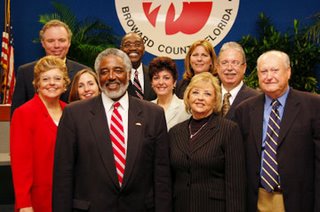
When it comes to the Broward County School Board's above-market-value
purchase of thirty acres of unusable wetlands from Southwest Ranches, the
Broward County School Board has no one to blame but itself.
Under Florida law, only in residential real estate transactions are sellers
required to disclose facts materially affecting the value of the property
which are not readily observable and are not known to the buyer. In
non-residential transactions, the law in Florida is "let the buyer beware."
In a non-residential real estate transaction in Florida, there is no duty of
disclosure. In reality, a buyer of non-residential land has no excuse for
relying on representations about the land made by the seller, much less the
seller's broker.
Perhaps the Florida legislature should look into making a law to impose a
duty of disclosure on the sellers of land to school boards and other
government entities in order to protect taxpayers from ill-advised real
estate purchases made by credulous politicians and staff.
Saturday, October 07, 2006
Democrats and Republicans Financed by Same Large Corporations and Have Similar Agendas?
Democrats and Republicans are two branches of the same party. Call it the
Demopublican Party or the Republicrat Party-- call it whatever you want. The
reality is that both Democrats and Republicans are financed by the same large
corporations and have similar agendas.
The Democratic agenda is a bit more liberal than the Republican one,
but when it comes to legislation regarding their mutual big contributors-- the
oil and gas oligopolies, the insurance companies, the Wall Street investment
firms, the pharmaceutical giants, the military hardware manufacturers, etc.--
the Democrats are only slightly less guilty than Republicans of prostituting
themselves for money to finance their campaigns.
Teddy Roosevelt warned us about this problem at the beginning of the
last century, calling the Big Money interests who buy and sell politicians the
"malefactors of wealth." His cousin, FDR, cut into their power during the Great
Depression and they plotted to overthrow him. Eisenhower admonished us about
them in his famous beware the military/industrial complex speech. And even Nixon
butted heads with them on occasion.
But ever since Ronald Reagan became the standard-setting shill for Big
Business, political candidates know their place and rarely cross their corporate
sponsors. Ditto with members of the mainstream news media. And anyone who dares to create legislation or tax policy to cut into their profits or attempts to
promote a populist agenda will be marginalized or destroyed. Howard Dean found
that out the hard way when he ran in the Democratic primary against Kerry.
AAARRR!!
And this is why Democrats have kept their mouths shut in the last three
elections and have accepted their losses with humility. If they want to stay in
the game and continue to accept the largesse of their malefactors, they must be
"good team players," a code phrase that transcends politics and applies to all
craven employees who want to survive in today's cutthroat work
environment.
Friday, October 06, 2006
Great Quotes About Freedom and Tyranny

Dogma demands authority, rather than intelligent thought, as the source of opinion; it requires persecution of heretics and hostility to unbelievers; it asks of its disciples that they should inhibit natural kindliness in favor of systematic hatred. - Bertrand Russell, Unpopular essays Unhappy events abroad have retaught us two simple truths about the liberty of a democratic people. The first truth is that the liberty of a democracy is not safe if the people tolerate the growth of a private power to a point where it becomes stronger than the democratic state itself. That, in its essence, is fascism - ownership of government by an individual, by a group, or by any other controlling private power. (FDR: message to Congress proposing the monopoly investigation, 1938)
"The world is a dangerous place to live, not because of the people who are evil, but because of the people who don't do anything about it." - Albert Einstein
“Throughout history, it has been the inaction of those who could have acted; the indifference of those who should have known better; the silence of the voice of justice when it mattered most; that has made it possible for evil to triumph.” - Haile Selassie
A tyrant must put on the appearance of uncommon devotion to religion. Subjects are less apprehensive of illegal treatment from a ruler whom they consider god-fearing and pious. On the other hand, they do less easily move against him, believing that he has the gods on his side. – Aristotle
So long as the people do not care to exercise their freedom, those who wish to tyrannize will do so; for tyrants are active and ardent, and will devote themselves in the name of any number of gods, religious and otherwise, to put shackles upon sleeping men. - Voltaire. François Marie Arouet (1694-1778)
Behind the ostensible government sits enthroned an invisible government owing no allegiance and acknowledging no responsibility to the people. To destroy this invisible government, to befoul the unholy alliance between corrupt business and corrupt politics is the first task of the statesmanship of the day": Theodore Roosevelt, April 19, 1906
The belief in the possibility of a short decisive war appears to be one of the most ancient and dangerous of human illusions: Robert Lynd (1879-1949), Anglo-Irish essayist, journalist.
The cry has been that when war is declared, all opposition should therefore be hushed. A sentiment more unworthy of a free country could hardly be propagated. If the doctrine be admitted, rulers have only to declare war and they are screened at once from scrutiny: William Ellery Channing
Only a free and unrestrained press can effectively expose deception in government. And paramount among the responsibilities of a free press is the duty to prevent any part of the government from deceiving the people: Black Hugo L.
There is almost no kind of outrage-----torture, imprisonment without trial, assassination, the bombing of civilians-----which does not change its moral color when it is committed by 'our' side. . The nationalist not only does not disapprove of atrocities committed by his own side, he has a remarkable capacity for not even hearing about them." : George Orwell
The statesmen will invent cheap lies, putting the blame upon the nation that is attacked, and every man will be glad of those conscience-soothing falsities, and will diligently study them, and refuse to examine any refutations of them; and thus he will by and by convince himself that the war is just, and will thank God for the better sleep he enjoys after this process of grotesque self-deception. Mark Twain, "The Mysterious Stranger" (1910)
If Tyranny and Oppression come to this land, it will be in the guise of fighting a foreign enemy: James Madison: US fourth president, 1751-1836
A great wave of oppressive tyranny isn't going to strike, but rather a slow seepage of oppressive laws and regulations from within will sink the American dream of liberty: George Baumler
The means of defense against foreign danger historically have become the instruments of tyranny at home: James Madison: US fourth president, 1751-1836
Power always has to be kept in check; power exercised in secret, especially under the cloak of national security, is doubly dangerous : William Proxmire
 Stumble It!
Stumble It!